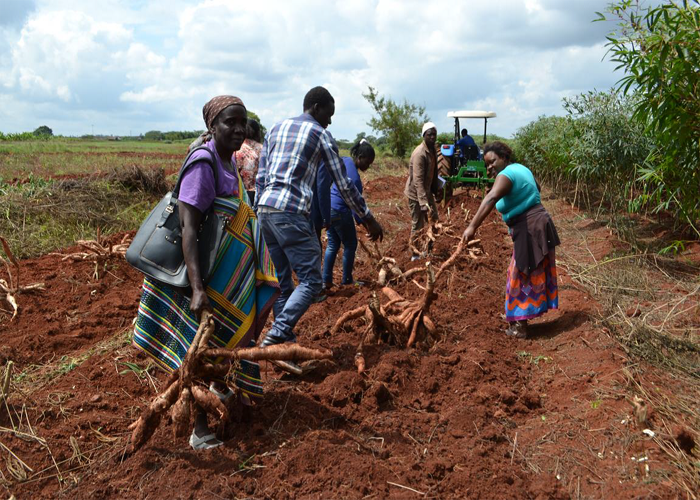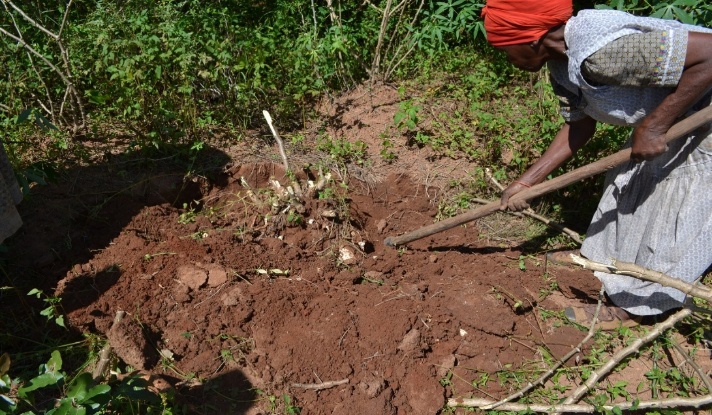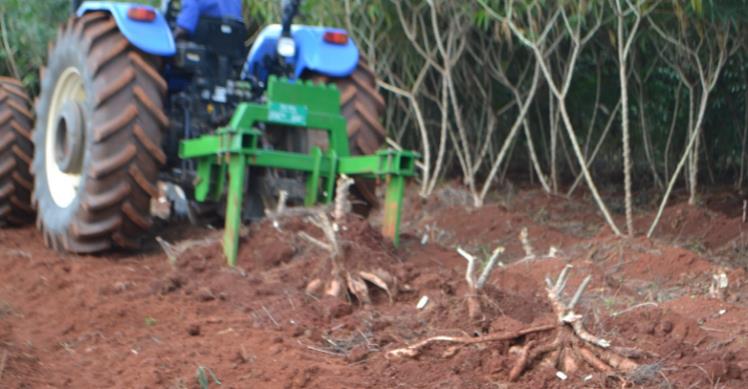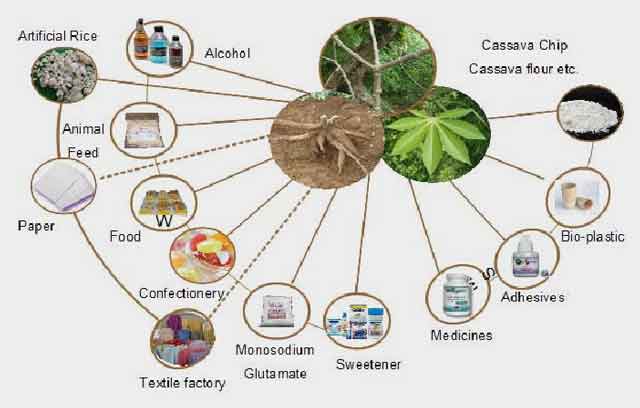TEK MECH Cassava Harvester
DEVELOPED @ KNUST FOR THE WORLD
Agricultural Engineering Department
Kwame Nkrumah Univ. of Sci. & Tech (KNUST)
Kumasi. GHANA
Cell: +233(0)245431872
E-mail: emmanuel.bobobee@gmail.com

Emmanuel Bobobee is an Associate Professor of Agricultural Machinery Engineering, in the Agricultural Engineering Department, Kwame Nkrumah University of Science and Technology (KNUST), Kumasi. Ghana. He was a Specialist Researcher at the Agricultural Research Council, Institute for Agricultural Engineering (ARC-IAE) in Pretoria, South Africa from 2013-2015. Emmanuel holds PhD in Agricultural Machinery Engineering (Sweden), MSc in Agricultural Machinery Engineering (UK), and BSc in Agricultural Engineering, KNUST, Kumasi, Ghana.
Prof. Bobobee has vast experience in Agricultural Equipment development and mechanization. He has invented the TEK Mechanical Cassava Harvester (patent pending) for harvesting cassava and other root and tuber crops for which he has received the 1st Engineering Excellence Award 2014 (Individual) in the category of Public Sector (State Owned Enterprises) from the Ghana Institution of Engineers in December 2014, and 3rd prize in a pitch presentation at the Royal Academy of Engineering, London in March 2015.


Farmers’ day on cassava harvesting in South Africa Mechanically harvested cassava in a windrow
Emmanuel has also developed the “Tek Groundnut Cracker Winnower” that cracks and winnows groundnut in a single operation, a motorised maize sheller, rice thresher, table-top forage chopper, abrasive wear testing equipment and wear resistant ploughshares suitable for all soil engaging implements.
Emmanuel has authored and co-authored over 42 scientific and technical publications in Agricultural Engineering.


MOFA Min Hon Kofi Humado comissioned harvesters Cassava planted on ridges to aid mechanisation
THE CHALLENGES
The low level of engineering technology inputs into agriculture is one main constraint hindering the modernization of agriculture and food production in many parts of the world.
Cassava (Manihot esculenta Crantz) is an important food security, industrial and energy crop in the world. Its roots provide dietary carbohydrates for over 800 million people. Global cassava production in 2012 was 282 million tonnes, with 56% by Africa, 30% by Asia, and 14% produced in South America. Cassava is a bio-fuel source that can replace fossil fuel.
Harvesting is a major constraint to commercialise cassava production in sub-Saharan Africa. Manual cassava harvesting is a painful, stressful and time consuming activity full of drudgery especially, during the dry season.
Until recently, there are no commercial mechanical cassava harvesters in use by cassava growers in Africa. This makes cassava production to be full of drudgery, unattractive to the youth and dependent on aging farmers, who produce limited outputs with little export potential.

Slow and painful manual cassava harvesting
THE OPPORTUNITY
The development and adoption of a device to harvest cassava mechanically is one solution proposed to unlock the huge potential of cassava as food and for industry.
A prototype mechanical cassava harvester of 300 kg mass and one metre wide with slatted conical mouldboard has been developed and evaluated in Ghana and South Africa for large-scale cassava production. In tropical and subtropical Asia and the southern sub-tropics of South America cassava is a booming business with cassava changing from a traditional food crop to be a giant export-oriented industry, particularly in Vietnam and Thailand.
Cassava has a number of attributes that make it attractive as a crop to promote under any climate change adaptation strategy for sub-Saharan Africa. Cassava provides an excellent insurance against famine for farmers. To create awareness, field demonstration and advertising are to be stepped up to introduce and popularise the harvester to cassava farmers, entrepreneurs, policy makers and other stakeholders in the cassava value chain on the continent. Continuous scientific and technical backstopping by research team will sustain further improvement of the technology.

Efficient TEK Mechanical Cassava Harvester in operation
THE FUTURE?
Support is needed to quick-start a manufacturing company to produce the harvester on commercial scale, carry out more market research, advertise and promote the device among cassava growers and starch producers in Africa and beyond.
The only spare part of the device is the digging blade that wears and needs replacement after harvesting a certain farm size. Continuous scientific research is needed to develop soil specific wear resistant blades to prolong lifespan and reliability of the device for users.
China, Thailand and Brazil also produce cassava harvesters but the TEK Mechanical Cassava Harvester (TEK MCH) is lighter and does not require any dedicated high power-rated tractors. The device can be pulled by existing tractors owned by small-scale farmers on the continent.
Funds are needed to undertake more market research, develop durable blades, train manufacturers and tractor operators in the proper production, operation, repairs & maintenance of the implement during this initial introductory stage.

Some industrial products from cassava